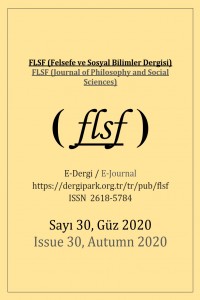From The Judgments of Taste To Law And Politics: The Traces of Aesthetics In Kant’s Metaphysics of Morals
Öz
Kant’s Critique of Judgment which addresses the theory of aesthetics is considered by the commentators such as Arendt as a last work which does not only involve art and the judgments of taste, but also his political philosophy which is said to be existed neither before nor after such work. It is also broadly accepted that his Metaphysics of Morals which is written after the “Third Critique“ proposes a kind of constitutive theory of law rather than a political debate that we could not find his theory of aesthetics in this work. Yet it could be noticed with a closer look that after concluding the “three critique” project, the Metaphysics of Morals’ Kant, while returning back to the issues which had been handled in the Groundwork for the Metaphysics of Morals, is now a new Kant who is mediated through “the faculty of aesthetical judgment”. For while relating the faculty of desiring with the moral law, his theory of law begins by addressing the aesthetic pleasure, starts from the point where the Critique of Judgment reached, proceeds with the property and the state, ends with a cosmopolitan ideal and then passes to the theory of virtue in the second chapter. Thus, reading the Metaphysics of Morals with such a perspective could give a chance to understand how the link between aesthetics and the political philosophy that is constituted by Kant passes beyond the “Third Critique” in contrast to the general acceptance. In this context, pointing out the astonishing relationship between his core concepts such as “property”, “contract” which takes places in his theory of law and the judgments of taste, this paper will be focused on revealing the aesthetics in Kant’s doctrine of law, in other words, noticing the “beauty” behind the theories of law and politics.
Anahtar Kelimeler
Kaynakça
- ARENDT, Hannah. 2019. Kant’ın Siyaset Felsefesi Üzerine Dersler. Çev. Devrim Sezer&İsmail Ilgar. İstanbul: İletişim Yayınları.
- ÇIRAKMAN, Elif. 2019. “Kant’ın Eleştirel Felsefesinde Doğanın Erekselliği Sorunu”. (Yayınlanmamış Kitap Bölümü)
- DE DUVE, Thierry. 1996. Kant after Duchamp. London: MIT Press.
- DELEUZE, Gilles. 1995. “Kant’ın Eleştirel Felsefesi”. Çev. Taylan Altuğ. İstanbul: Payel Yayınevi.
- ESGÜN, Toros Güneş.2017. Kant’ın Hukuk Öğretisinde Yurttaşlık Durumuna Geçiş ve İzin Verici Yasanın Olanakları . FLSF Felsefe ve Sosyal Bilimler Dergisi , (23) , 139-158.
- KANT, Immanuel. 1977. Kritik der Urteilskraft. Werke in zwölf Bänden Berlin: Suhrkamp Taschenbuch.
- KANT, Immanuel. 1977. Metaphysik der Sitten. Werke in zwölf Bänden Berlin: Suhrkamp Taschenbuch.
- KANT, Immanuel. 2010. “Yaygın Bir Söz Üstüne: ‘Teoride Doğru Olabilir Ama Pratikte İşe Yaramaz”, Kant Felsefesinin Politik Evreni içinde, ss.17-57.der. ve çev. Hakan Çörekçioğlu, İstanbul: İstanbul Bilgi Üniversitesi Yayınları.
- LAMBIER, Joshua D. “A Capacity to Resist: Kant’s Aesthetics and the Right of Revolution”, European Romantic Review, 27:3; ss. 393-403.
- RANCIÈRE, Jacques. 2016. Estetiğin Huzursuzluğu. İstanbul: İletişim Yayınları.
- WOOD, Allen. 2009. Kant. Çev. Aliye Kovanlıkaya. Ankara: Dost Kitabevi.
Öz
Kant’ın estetik kuramını ele aldığı Yargı Yetisinin Eleştirisi Arendt gibi bazı yorumcular tarafından sadece sanatı ve beğeni yargılarını değil, aynı zamanda bu eserden ne önce ne sonra mevcut olduğu iddia edilen politika felsefesini içeren bir son eser olarak konumlandırılır. “Üçüncü Kritik”’ten sonra yazdığı Ahlak Metafiziği’nin ise kurucu bir hukuk kuramı sunuyor olduğu genel kabul gören bir görüştür ve yine bu görüşe göre bu eserde Kant’ın estetik kuramının izi yoktur. Oysa yakından bakıldığında “üç kritik” projesi bittikten sonra Ahlak Metafiziği’nde konuşan Kant’ın Ahlak Metafiziğinin Temellendirmesi’nde uğraştığı meselelere dönerken artık “estetik yargı yetisi”nin dolayımından geçmiş, yeni bir Kant olduğu görülebilir. Zira hukuk kuramı arzulama yetisinin ahlak yasası ile ilişkisini kurarken estetik hazzı ele alarak başlar, Yargı Yetisinin Eleştirisi’nin ulaştığı yerden yola çıkar, mülkiyet ve devlet ile devam eder, kozmopolitan bir ideal ile sona erer ve ikinci bölümü erdem kuramına bırakır. Dolayısıyla Ahlak Metafiziği’ni bu bakışla okumak, Kant’ın estetik ve politika felsefesi arasında kurduğu bağın genel kabulün aksine “Üçüncü Kritik”in ötesine nasıl geçtiğini anlamak demektir. Bu çalışmada da Kant’ın Ahlak Metafiziği eserinde gizlenen estetik kavrayışın hukuk ve politika kuramıyla bağı ele alınacaktır. Bu bağlamda hukuk öğretisindeki “mülkiyet”, “sözleşme” gibi anahtar kavramların beğeni yargılarıyla şaşırtıcı ilişkisi gösterilerek Kant’ın hukuk öğretisindeki estetiği açığa çıkarmak, yani hukuk ve politikanın arkasındaki “güzel”i göstermek çalışmanın odağını oluşturmaktadır.
Kaynakça
- ARENDT, Hannah. 2019. Kant’ın Siyaset Felsefesi Üzerine Dersler. Çev. Devrim Sezer&İsmail Ilgar. İstanbul: İletişim Yayınları.
- ÇIRAKMAN, Elif. 2019. “Kant’ın Eleştirel Felsefesinde Doğanın Erekselliği Sorunu”. (Yayınlanmamış Kitap Bölümü)
- DE DUVE, Thierry. 1996. Kant after Duchamp. London: MIT Press.
- DELEUZE, Gilles. 1995. “Kant’ın Eleştirel Felsefesi”. Çev. Taylan Altuğ. İstanbul: Payel Yayınevi.
- ESGÜN, Toros Güneş.2017. Kant’ın Hukuk Öğretisinde Yurttaşlık Durumuna Geçiş ve İzin Verici Yasanın Olanakları . FLSF Felsefe ve Sosyal Bilimler Dergisi , (23) , 139-158.
- KANT, Immanuel. 1977. Kritik der Urteilskraft. Werke in zwölf Bänden Berlin: Suhrkamp Taschenbuch.
- KANT, Immanuel. 1977. Metaphysik der Sitten. Werke in zwölf Bänden Berlin: Suhrkamp Taschenbuch.
- KANT, Immanuel. 2010. “Yaygın Bir Söz Üstüne: ‘Teoride Doğru Olabilir Ama Pratikte İşe Yaramaz”, Kant Felsefesinin Politik Evreni içinde, ss.17-57.der. ve çev. Hakan Çörekçioğlu, İstanbul: İstanbul Bilgi Üniversitesi Yayınları.
- LAMBIER, Joshua D. “A Capacity to Resist: Kant’s Aesthetics and the Right of Revolution”, European Romantic Review, 27:3; ss. 393-403.
- RANCIÈRE, Jacques. 2016. Estetiğin Huzursuzluğu. İstanbul: İletişim Yayınları.
- WOOD, Allen. 2009. Kant. Çev. Aliye Kovanlıkaya. Ankara: Dost Kitabevi.
Ayrıntılar
| Birincil Dil | Türkçe |
|---|---|
| Konular | Felsefe |
| Bölüm | Araştırma Makalesi |
| Yazarlar | |
| Yayımlanma Tarihi | 10 Aralık 2020 |
| Gönderilme Tarihi | 29 Eylül 2020 |
| Kabul Tarihi | 29 Ekim 2020 |
| Yayımlandığı Sayı | Yıl 2020 Sayı: 30 |
Dergimiz 2024 yılından itibaren ikisi olağan biri dosya konulu özel sayı olmak üzere 3 sayı olarak, Mayıs (olağan sayı) Eylül (özel sayı) ve Aralık (olağan sayı) aylarında yayınlanacaktır.
Özel sayılarımızda yalnızca dosya kapsamında yer alan makalelere yer verilecektir. Makalenizi gönderirken hangi sayıda değerlendirilmesini istediğinizi bir notla bildirmeniz karışıklıkları önleyecektir.
İlginiz için teşekkür ederiz.

